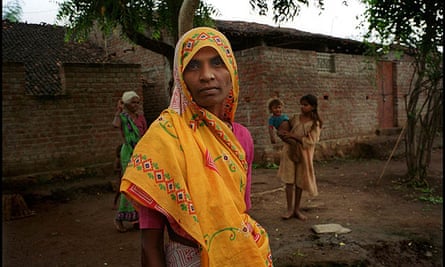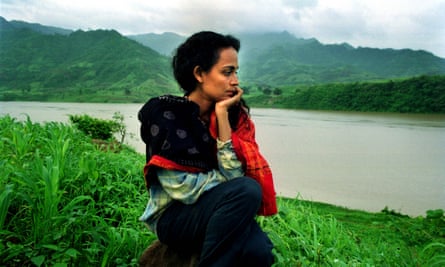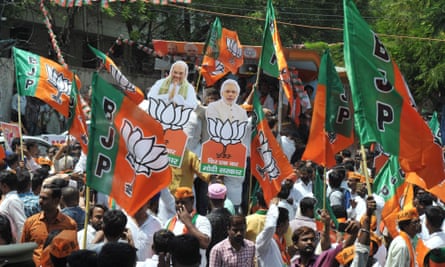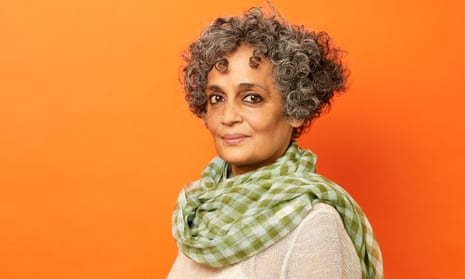Gary Younge: One of the things I’m intrigued by at this moment is the way that we keep getting shocked by elections. Modi in India, the Australian elections – these hard-right people who don’t just win, they win again. It’s possible that Trump could win again. It’s possible we could have Boris Johnson as a UK prime minister, and each time we get shocked.
Arundhati Roy: I was in the US just now and it was very interesting to see, with someone who was mocked and laughed at like Trump has been, that there’s a very real possibility that he’ll come back. But there is a big difference between Modi and Trump. Modi has a 95-year-old organisation behind him, with 600,000 volunteers. People have been working towards this for a long time.
GY: Yet despite our methods of resistance, while the left can get larger numbers of people on the streets, we don’t seem to be able to make it cohere into something effective. There’s a conundrum in this moment where America can have four of the largest demonstrations in its history in the last two years and yet Trump is still politically viable.
AR: In India, when they say left, they mean communist parties. And here, the great failure of the left has been to not be able to deal with caste. I suppose in the US it’s to have not been able to deal with race. All my writing from The God of Small Things onwards has a lot to do with that. Because caste is the engine that runs modern India. You can’t just get away in India with saying “Caste is class, comrade”. It’s not true.
GY: In a sense, while all of the situations are different, one can think of the same model being replicated in a range of ways: Trump comes after Obama, Bolsonaro comes after the Workers’ party. We create this space, we build badly on it and then someone comes in with a wrecking ball. Is that a failure of political education, or a failure of an agenda? What are we doing wrong?
AR: I learned a lesson soon after the massacre in 2002 of Muslims, when 2,000 people were slaughtered on the streets. I wrote about it and I thought that just describing what happened was a form of politics. To say: “This happened, these people were killed.” But people just turn around and say: “So what? They deserve it.” And you realise that compassion is never going to be a major guiding rule in this. Similarly, what I see happening now with this rabid fear of immigrants, it gains traction. And how do you manage it?
GY: Every now and then though, there is a response, isn’t there? From progressives, from that broad swathe of people who find this reactionary moment very difficult. The anti-war protests, all those people who lined up as Syrians were coming into Germany and handed them water, Occupy Wall Street or Black Lives Matter. We see these eruptions of compassion.

AR: Yes, there is solidarity. I think in the US, the Occupy movement changed the language. Today people are talking about the 99% and the 1%. Things that were not allowed to be said are being said. You have Bernie Sanders out there, who you would not have had a while ago. There is an understanding that has dawned, even in the US, where you thought it’s never going to happen. And I would say that there has been a fantastic and deep and wise resistance in India, which has at least, even if it hasn’t won, slowed things down in a way that is incredible.
GY: How do you make sense of that as a person who’s devoted much of their life to moving things in a different direction? On the one hand there is the money, the venality, which is growing in power. And on the other you have the resistance, which is growing in sophistication, arguably, and in analysis. Does that leave you feeling optimistic or pessimistic?
AR: That changes from minute to minute and day to day. Whether you’re thinking on a macro scale or whether it’s something very immediate. There is a great sense of dread in me, and that doesn’t have to do with this election, which is a minor thing in the scale of what I see going on. There are so many people and so few resources. Whether it’s water, whether it’s land – you see the joblessness, the desperation. What appears on the surface to be a clash of two castes, or two religions, or two communities – underneath that you can see a crisis looming. And then you turn your attention to the bird that’s building its nest in the tree and try to blank everything out. And I say to myself, whatever happens, let’s leave the record of what was done to us, to our minds, to our imagination.
GY: Your new book is a collection of essays written over 20 years. In the foreword, you write about having published your novel The God of Small Things and all this money is coming in, and you’re being hailed as this exemplar of a new India that you really want nothing to do with in terms of its political trajectory. Then there seems to be a shift in vocation, or in the idea of what your writing is going to do. So I wanted to ask, what do you think these essays did? What do you hope this book will do?

AR: I believe in the power of narrative. Intrinsically, I am a storyteller. So as soon as I went to the Narmada valley [where 250,000 people were displaced for a dam], I knew that it had a story. That valley had a story that needed to be told differently from the way stories about childhood and identity and caste are told.
GY: For the most part writers, fiction writers, have not made that jump. Is that because it’s more comfortable not to? The things you list in the book that have happened to you, in terms of death threats and legal action. There was an easier life for you?
AR: I don’t think it has to do with fiction or non-fiction, it’s to do with the politics. To me, as a person who lives in this country, there is a sort of humiliation involved in not trying to understand. I suppose it also has to do with a certain lack of ambition on my part. When I wrote The God of Small Things obviously I had no idea that it would be so successful. I was just happy to use the fact that now I was financially independent, I could do what I wanted, what I thought. My instinct made me back away from the literary world. I did speak a lot and travel with the non-fiction, because it needs to be spoken about and it’s not just about me. It’s about a lot of people involved in these battles and the battles themselves are important.
GY: So much of your work is rooted in India, but a lot of it translates beyond. We’re talking about ecology, environment, corrupt government, fascism, communalism. When you travel the world, do you find the connections easy to make between your work and where you’re visiting?

AR: That’s a very interesting question. The God of Small Things is about the small village where I grew up in south India – a very specific culture in that sense. And it has been translated into 42 languages. I would go to Estonia and someone would say: “This is my childhood, how did you know about it?”
I had a lot of foreign magazines and newspapers saying: “Will you write for us?” But I was sure of one thing, which was that I don’t want to become this interpreter of the east to the west. I don’t want my language to be edited into the formats that fit these publications. I want to write the way I want to write. If it fits you, fine; if it doesn’t, fine; I’m writing for here. The argument is here, the battle is being fought here. Really, there is no need for me to explain it, because I think readers are as mysterious as writers, and they understand things. You don’t have to cater to them.
GY: I wanted to ask about the essay The Doctor and the Saint, in which you argue that BR Ambedkar’s challenge to Gandhi’s near-divine status was suppressed by India’s elite, in order to reinforce a certain idea of India, and in particular the caste system. The reverence for Gandhi, and the “invisibilising” of Ambedkar in history, how do we understand that in this current moment?
AR: Well, in the west of course he’s been invisibilised completely. But in India he’s always been visible and loud. Whenever people come here, I say if you go into the poorest house in India you don’t find a portrait of Gandhi, you will find a portrait of Ambedkar. But all of us were subject to this falsification of our own history, which was in some ways deeply distressing and enraging.

GY: It seems to be a feature of the modern right, to be able to convince people that things happened when they didn’t, and to persuade people to do things that will hurt themselves. I’m interested in that capacity to get people to act against their own interests.
AR: Well I would say that one of the great shortcomings of the left, by which I mean even the communist left, is the reduction of everything to materialism, and an inability to understand the complex psychologies that people have. In India, hundreds of thousands of farmers are committing suicide because they are in debt. But it’s not a simple case of: people are hungry therefore there’ll be a revolution. It doesn’t work like that.
GY: How long do you think it’s going to be before the left, in whatever form, gets that?
AR: I think that the coming crisis – the joint attack of climate crisis and machine intelligence – is going to mean a relooking at what we mean by left and right. Those categories are not going to be as neat as we make them out to be now. And as resources shrink and as seas rise, you’re going to have people clubbing together as a tribe, as a caste, as a race, as a nation, in order to lay claim to those shrinking resources. And the right is always going to be at hand to offer hatefulness.
GY: But shouldn’t we be at hand?
AR: We should be at hand. But the point is, how do you propose justice – if that is indeed what we propose – when it isn’t the weapon? Injustice is the weapon. I don’t want us to wear ourselves down by how ineffective we have been, because I don’t think that is necessarily true either. You think how much worse it would’ve been if there wasn’t this countervailing force.
GY: At the end of the foreword to My Seditious Heart you say the question before us is who or what will rule the world? Can you explain that?
AR: To me the real problem is summed up in my essay Mr Chidambaram’s War. I start with a flat-topped mountain in Odisha. When geologists look at the mountain they see bauxite, and they see that it needs to be mined. When other people look at it, people who have lived on that mountain, that flat mountain is a porous mountain, it’s a water tank, it has held the water of the monsoon and the water of the plains for centuries. For the mining companies, the mountain is worth the cost of the bauxite that can be mined. For the people around, that bauxite is worth nothing if it’s outside the mountain. So that essay ends with the question: can we leave the bauxite in the mountain? It relies on imagination that neither the left or the right has. To decide how you’re going manage without it – that is the understanding that we need.
GY: Do you think we can leave the bauxite in the mountain? Do we have that imaginative capacity?
AR: Some of us do and some of us don’t. I’m saying that we, the people who do and are waging that battle, must be supported. The first step is to preserve that imagination and then move on from there.
